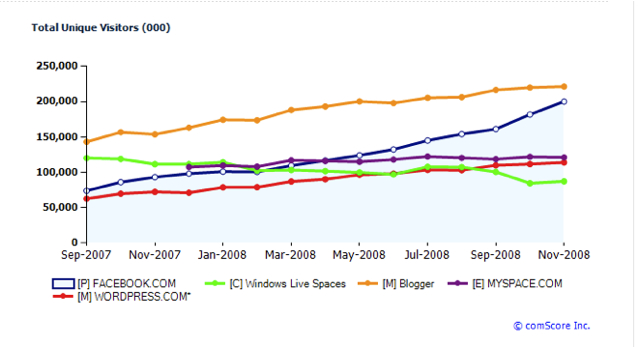Recently my email inbox has been filling up with messages from Twitter saying the “xxx has requested to follow you on Twitter”. This was mysterious because (a) in most cases I didn’t know the people allegedly making these requests; and (b) my Twitter updates are ‘protected’ — i.e. visible only to those I’m allowing to follow me. The solution to puzzle (a) is that most of these ‘requests’ are from people who hope I will visit their websites in order to check on their identities — so the requests are, in a way, a form of spam. (And, as such, doomed to fail.) I’m still slightly puzzled by (b). I guess people discover I’m on Twitter by finding me on someone else’s followed/following list. So the trick is to pick a Twitter ‘hub’ like Stephen Fry or Rory Cellan-Jones and then ransack his list for spam targets.
Category Archives: Social Networking
A presentation about ‘community’ — by a community
Neil Perkin had an interesting idea. Asked to give a presentation about online communities he created one by asking people to contribute a slide each. Then he assembled the slides into a presentation — and put it on SlideShare. Great idea, nicely implemented. And genuinely thought-provoking.
Job Loss in the Age of Blogs and Twitter
Interesting WSJ.com piece.
Internet games, gambling and other forms of online entertainment have seen significant surges in use in the several months since the economic downturn deepened. Social-networking services like Facebook, blogs and discussion forums — all well-known time sinks even during good times — are also seeing strong growth. Some purveyors of online entertainment say business has never been so good for them.
Robert Kraut, a professor of social psychology and human computer interaction at Carnegie Mellon University in Pittsburgh, says games and other forms of entertainment can provide escape for people steeped in anxieties about the economy. “There’s evidence these distractions have a psychological benefit because they prevent a downward spiral of rumination,” says Dr. Kraut.
Google vs Twitter
Tony Hirst has a really interesting graphical comparison of Google and twitter traffic during Obama’s Inauguration.
US adults and social networking
A new report from Pew Research Center’s Internet & American Life Project on ‘Adults and Social Network Websites’ looks at how adults use sites like Facebook, LinkedIn and MySpace. Among the main findings of the report:
The ‘first Facebook arrest’?
From The Register.
A failed safe-cracker has been cuffed after New Zealand police posted CCTV images of an attempted burglary on Facebook.
CCTV cameras captured the hour-plus attempts of a man who attempted to prise open a safe at the Frankton Arms Tavern in the early hours of Monday morning. The man broke in through the ceiling of the bar before dismally failing to smash open the safe using only an angle grinder and a crowbar. It was hot work and the suspect foolishly took off the balaclava he was wearing, before he spotted the camera.
He fled soon afterwards, leaving an estimated NZ$20,000 ($11,040) of weekend takings still safely locked in the safe. Local police posted images of the blagger on a crime-fighting page on Facebook, prompting a witness to come forward to name a suspect.
Images of the break-in were also published through news websites and in newspapers but it was Facebook that did the business. Local police are describing the case as their ‘first Facebook arrest’.
Laptops in class
Interesting post by Eoin O’Dell of TCD law school on an issue that vexes an increasing number of university teachers.
I’ve been on both sides of these laptops, and I’m going to break ranks and admit something to those students reading this blog: from the front of the class, I can often tell when someone is concentrating on the screen for reasons other than the class. For example, it’s pretty obvious if you’re furiously typing away while everyone else is doing nothing at all, studiously failing to answer a question I’ve just posed – gotcha! you’re drafting an email or updating a profile, aren’t you? Now, this is an extreme example, but there are lots of obvious examples short of that, and even if I don’t notice every non-classroom related usage, I do notice a lot of them. And in my class, you run the risk of having a few questions directed specifically to you just when you’re deepest into your online distraction. But I don’t see myself going any further and seeking to turn off the wifi or even ban the laptops. I think that the benefits of technology far, far outweigh the detriments. And, in any event, people who are bored in class will daydream even if they don’t surf.
Twitter in 126 characters
From Dave Winer.
Jay Rosen asked: "Write a 140 character post that explains what you find Twitter useful for."
DW: "Twitter is my shared notepad. If I want to remember something and I don't mind if everyone else knows it, I just post it here."
Only 126 characters.
FaceBook still rising. But what’s happening to MS LiveSpaces?
What Should I Read Next?
Interesting idea — What Should I Read Next?. You type in the title and author of a volume that you’ve finished reading and it comes up with suggestions. It’s based, I’d guess, on a collaborative filtering algorithm. It’ll get better with more signed-up users, but it wasn’t very impressive on first attempts. For example, it’d never heard of J.K. Galbraith’s The Great Crash, and produced weird follow-ups for Clay Shirky’s Here Comes Everybody.

